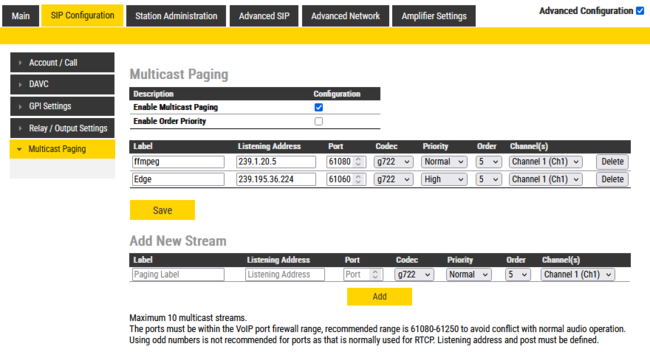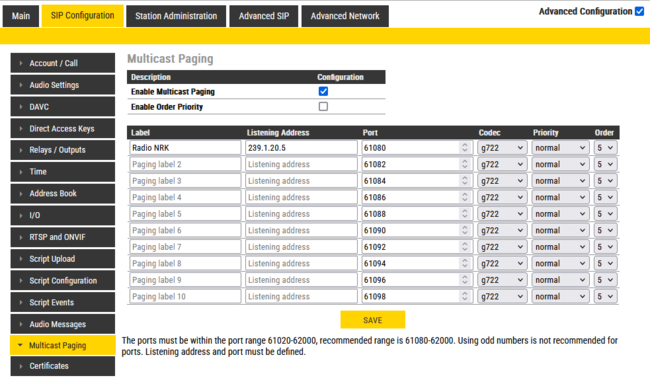Multicast Paging (Edge/SIP): Difference between revisions
From Zenitel Wiki
No edit summary |
(Add L16x48D codec) |
||
| Line 4: | Line 4: | ||
* ''Required software: [[:Category:Stations#Turbine_stations|Turbine]] 5.0 or newer. [[:Category:Stations#INCA_stations|INCA]] 2.10 or newer'' }} | * ''Required software: [[:Category:Stations#Turbine_stations|Turbine]] 5.0 or newer. [[:Category:Stations#INCA_stations|INCA]] 2.10 or newer'' }} | ||
== Configuration == | ==Configuration== | ||
To configure a device to receive Multicast Paging, [[Logging into an IP Station|log into the device]], enable '''Advanced Configuration''' mode, and select '''SIP/Edge Configuration''' > '''Multicast Paging''': | To configure a device to receive Multicast Paging, [[Logging into an IP Station|log into the device]], enable '''Advanced Configuration''' mode, and select '''SIP/Edge Configuration''' > '''Multicast Paging''': | ||
| Line 12: | Line 12: | ||
</gallery> | </gallery> | ||
* '''Enable Multicast paging''': When enabled, the station is capable of playing audio received as Multicast | *'''Enable Multicast paging''': When enabled, the station is capable of playing audio received as Multicast | ||
* '''Enable Order Priority''': | *'''Enable Order Priority''': | ||
** '''Enabled''': If the station is exposed to two (or more) multicast VoIP streams at the same time, and the VoIP streams have the same "''Priority''", the VoIP stream with the lowest "''Order''" priority number will be played. | **'''Enabled''': If the station is exposed to two (or more) multicast VoIP streams at the same time, and the VoIP streams have the same "''Priority''", the VoIP stream with the lowest "''Order''" priority number will be played. | ||
** '''Disabled''': The "''Order''" will be ignored. If the station is exposed to two (or more) multicast VoIP streams at the same time, and the VoIP streams have the same priority, the first received VoIP stream will be played. Subsequent VoIP streams will not be played. | **'''Disabled''': The "''Order''" will be ignored. If the station is exposed to two (or more) multicast VoIP streams at the same time, and the VoIP streams have the same priority, the first received VoIP stream will be played. Subsequent VoIP streams will not be played. | ||
* '''Label''': Any descriptive text | *'''Label''': Any descriptive text | ||
* '''Listening Address''': The multicast IP address that the station shall listen to, e.g. 239.195.124.240. Multicast IP addresses are in the range from 224.0.0.0 to 239.255.255.255. | *'''Listening Address''': The multicast IP address that the station shall listen to, e.g. 239.195.124.240. Multicast IP addresses are in the range from 224.0.0.0 to 239.255.255.255. | ||
* '''Port''': The port number must be within the port range 61020-61250, recommended range is 61080-61250. Using odd number for port is not recommended. The port must be unique in the list. | *'''Port''': The port number must be within the port range 61020-61250, recommended range is 61080-61250. Using odd number for port is not recommended. The port must be unique in the list. | ||
* '''Codec''': Select between codecs G.711a, G.711u, G.722 | *'''Codec''': Select between codecs G.711a, G.711u, G.722, G.729 and L16x48D. | ||
* '''Priority''': Select which priority mechanism should apply to this multicast VoIP stream. Options are LOW, NORMAL, HIGH (default), and EMERGENCY. See more details below. | *'''Priority''': Select which priority mechanism should apply to this multicast VoIP stream. Options are LOW, NORMAL, HIGH (default), and EMERGENCY. See more details below. | ||
* '''Order''': If the station is exposed to two (or more) multicast VoIP streams at the same time, and the VoIP streams have the same "''Priority''", the VoIP stream with the lowest "''Order''" priority number will be played. Requires that the "''Enable Order Priority''" option is enabled. | *'''Order''': If the station is exposed to two (or more) multicast VoIP streams at the same time, and the VoIP streams have the same "''Priority''", the VoIP stream with the lowest "''Order''" priority number will be played. Requires that the "''Enable Order Priority''" option is enabled. | ||
{{note|'''Order''' number 1 has the highest priority, 10 has the lowest priority.}} | {{note|'''Order''' number 1 has the highest priority, 10 has the lowest priority.}} | ||
== Paging priority == | ==Paging priority== | ||
Multicast paging uses 4 different priorities: LOW, NORMAL, HIGH, and EMERGENCY. | Multicast paging uses 4 different priorities: LOW, NORMAL, HIGH, and EMERGENCY. | ||
The priority mechanism has the following properties: | The priority mechanism has the following properties: | ||
== Configuration of Multicast streaming sources == | *A multicast page will terminate any ongoing page with lower priority. If two paging calls have same priority, then the one with lowest order number gets priority. | ||
=== Stream from FFmpeg === | *'''EMERGENCY''' priority includes a [[Volume and handset override (SIP)|Volume and handset override]] feature: | ||
**The volume is turned to maximum level on all receiving stations, and the audio is played on the loudspeaker, even if the handset is off-hook. | |||
**During emergency page the station will queue all incoming calls. When emergency page ends, the station will accept calls again. | |||
**If a station sends a busy override to a station listening on emergency page, then emergency page will stop | |||
*If a station is in a regular point-to-point call when receiving a page of defined priority: | |||
**'''LOW / NORMAL''' priority: The paging audio is not played | |||
**'''HIGH''' priority: The paging audio is mixed with the normal call | |||
**'''EMERGENCY''' priority: The regular call is muted | |||
==Configuration of Multicast streaming sources== | |||
===Stream from FFmpeg=== | |||
[https://ffmpeg.org/ FFmpeg] is the leading multimedia framework, able to decode, encode, transcode, mux, demux, stream, filter and play pretty much anything that humans and machines have created. | [https://ffmpeg.org/ FFmpeg] is the leading multimedia framework, able to decode, encode, transcode, mux, demux, stream, filter and play pretty much anything that humans and machines have created. | ||
| Line 55: | Line 56: | ||
{{note|If multiple ethernet interfaces are in use on the computer running ffmpeg, the multicast is sent to the interface with the lowest metrics (highest priority). Disable unused interfaces, or make sure that the interface used for streaming has the lowest metrics.}} | {{note|If multiple ethernet interfaces are in use on the computer running ffmpeg, the multicast is sent to the interface with the lowest metrics (highest priority). Disable unused interfaces, or make sure that the interface used for streaming has the lowest metrics.}} | ||
=== Stream from VLC=== | ===Stream from VLC=== | ||
To stream from VLC does not work due to variable payload size, same problem as on SNOM (Not possible to fix this). http://wiki.snom.com/Category:HowTo:Multicast_Audio#Multicast_via_VLC | To stream from VLC does not work due to variable payload size, same problem as on SNOM (Not possible to fix this). http://wiki.snom.com/Category:HowTo:Multicast_Audio#Multicast_via_VLC | ||
<br> | <br> | ||
=== Listen to Edge Group Call=== | ===Listen to Edge Group Call=== | ||
Go to [[Group_Call_(Edge)#Configuration_of_group_calls|Edge Controller -> Group Call]] and use the multicast address/port written in each group call. Note that the clients making the group call must use same codec as chosen for multicast paging. | Go to [[Group_Call_(Edge)#Configuration_of_group_calls|Edge Controller -> Group Call]] and use the multicast address/port written in each group call. Note that the clients making the group call must use same codec as chosen for multicast paging. | ||
<br> | <br> | ||
=== Use Multicast Paging with Asterisk=== | ===Use Multicast Paging with Asterisk=== | ||
Call 8998 to speak on multicast address: | Call 8998 to speak on multicast address: | ||
{{Code|exten <nowiki>=</nowiki>> 8998,1,Dial(MulticastRTP/basic/239.1.2.4:61084//c/g722))}} | {{Code|exten <nowiki>=</nowiki>> 8998,1,Dial(MulticastRTP/basic/239.1.2.4:61084//c/g722))}} | ||
=== Use Multicast Paging with Freeswitch iPBX=== | ===Use Multicast Paging with Freeswitch iPBX=== | ||
{{Code|<nowiki><extension name="rtp_multicast_page"> | {{Code|<nowiki><extension name="rtp_multicast_page"> | ||
Latest revision as of 08:39, 1 October 2024
Multicast Paging enables Zenitel devices in Edge or SIP mode to receive RTP multicast streaming from e.g. 3rd party iPBX (e.g. Asterisk). Up to 10 different Multicast paging groups can be defined.
Configuration
To configure a device to receive Multicast Paging, log into the device, enable Advanced Configuration mode, and select SIP/Edge Configuration > Multicast Paging:
- Multicast Paging configuration
- Enable Multicast paging: When enabled, the station is capable of playing audio received as Multicast
- Enable Order Priority:
- Enabled: If the station is exposed to two (or more) multicast VoIP streams at the same time, and the VoIP streams have the same "Priority", the VoIP stream with the lowest "Order" priority number will be played.
- Disabled: The "Order" will be ignored. If the station is exposed to two (or more) multicast VoIP streams at the same time, and the VoIP streams have the same priority, the first received VoIP stream will be played. Subsequent VoIP streams will not be played.
- Label: Any descriptive text
- Listening Address: The multicast IP address that the station shall listen to, e.g. 239.195.124.240. Multicast IP addresses are in the range from 224.0.0.0 to 239.255.255.255.
- Port: The port number must be within the port range 61020-61250, recommended range is 61080-61250. Using odd number for port is not recommended. The port must be unique in the list.
- Codec: Select between codecs G.711a, G.711u, G.722, G.729 and L16x48D.
- Priority: Select which priority mechanism should apply to this multicast VoIP stream. Options are LOW, NORMAL, HIGH (default), and EMERGENCY. See more details below.
- Order: If the station is exposed to two (or more) multicast VoIP streams at the same time, and the VoIP streams have the same "Priority", the VoIP stream with the lowest "Order" priority number will be played. Requires that the "Enable Order Priority" option is enabled.
Paging priority
Multicast paging uses 4 different priorities: LOW, NORMAL, HIGH, and EMERGENCY.
The priority mechanism has the following properties:
- A multicast page will terminate any ongoing page with lower priority. If two paging calls have same priority, then the one with lowest order number gets priority.
- EMERGENCY priority includes a Volume and handset override feature:
- The volume is turned to maximum level on all receiving stations, and the audio is played on the loudspeaker, even if the handset is off-hook.
- During emergency page the station will queue all incoming calls. When emergency page ends, the station will accept calls again.
- If a station sends a busy override to a station listening on emergency page, then emergency page will stop
- If a station is in a regular point-to-point call when receiving a page of defined priority:
- LOW / NORMAL priority: The paging audio is not played
- HIGH priority: The paging audio is mixed with the normal call
- EMERGENCY priority: The regular call is muted
Configuration of Multicast streaming sources
Stream from FFmpeg
FFmpeg is the leading multimedia framework, able to decode, encode, transcode, mux, demux, stream, filter and play pretty much anything that humans and machines have created.
Stream radio source in g722:
ffmpeg -re -i "http://lyd.nrk.no/nrk_radio_p13_mp3_h" -filter_complex aresample=16000,asetnsamples=n=160 -ac 1 -acodec adpcm_g722 -f rtp rtp://239.1.20.5:61080
|
Stream radio source in g711u/pcmu:
ffmpeg -re -i "http://lyd.nrk.no/nrk_radio_p13_mp3_h" -filter_complex aresample=8000,asetnsamples=n=160 -ac 1 -acodec pcm_mulaw -f rtp rtp://239.1.20.4:61082
|
Stream from VLC
To stream from VLC does not work due to variable payload size, same problem as on SNOM (Not possible to fix this). http://wiki.snom.com/Category:HowTo:Multicast_Audio#Multicast_via_VLC
Listen to Edge Group Call
Go to Edge Controller -> Group Call and use the multicast address/port written in each group call. Note that the clients making the group call must use same codec as chosen for multicast paging.
Use Multicast Paging with Asterisk
Call 8998 to speak on multicast address:
exten => 8998,1,Dial(MulticastRTP/basic/239.1.2.4:61084//c/g722))
|
Use Multicast Paging with Freeswitch iPBX
<extension name="rtp_multicast_page">
<condition field="destination_number" expression="^pagegroup$|^7243$">
<action application="answer"/>
<action application="esf_page_group" data="239.1.20.5 61086"/>
<action application="esf_multicast_write_codec" data="G722"/>
</condition>
</extension>
|




